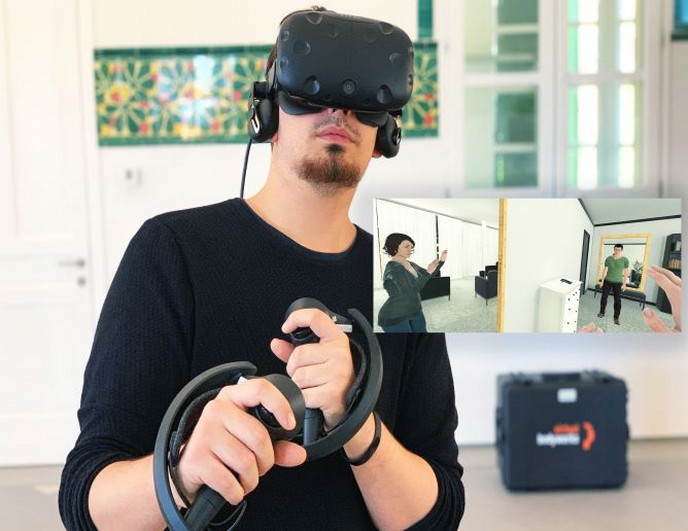The avatar that puts men in the mind of an abused woman
It’s a terrifying, no-win scenario for the female avatar. The door opens and a man walks into the room and begins shouting at her. If she says anything back or looks at him, he shouts: “Shut up!” It’s a virtual reality (VR) experience and the female avatar is being threatened by a male avatar in a cartoon world. But it feels very real to the person wearing the headset: a man used to being on the other end of the abuse. EU project VRespect.Me used the latest VR technology to put abusive men inside a woman’s body, on the receiving end of abuse, showing it can help such men change, potentially saving lives. It draws on research suggesting some men don’t realise what another person’s fear actually looks like. “Our interventions enhance the building blocks of empathy, such as improving the perpetrator’s ability to recognise their victims’ emotions,” said Mavi Sánchez-Vives, chief medical officer at Virtual Bodyworks, the Spanish company which developed VRespect.Me. “For the virtual offender, we carried out performance captures of an actor with technology similar to that used for Hollywood movies,” said Bernhard Spanlang, Virtual Bodyworks’ CTO. “Through modelling and programming, we transformed that data into the virtual reality experience.” In VRespect.Me and previous EU project www.vereproject.org (VERE), the researchers carried out five studies on the VR experience. One scientific study, ‘Offenders become the victim in virtual reality: impact of changing perspective in domestic violence’, was published in Nature. In a 4-year study, 184 convicted offenders experienced the scenario. Some 2.2 % of them reoffended during the follow-up period compared to 6 % after standard rehabilitation. This is preliminary data, but the results are encouraging.
New perspective
Researchers tested the system on prisoners and men serving suspended sentences in Catalonia, north-east Spain. The results impressed those working with abusive men. The Catalan regional government has bought VRespect.Me for a prison in Tarragona. Other organisations in Europe have also ordered it. They are hoping to reduce a problem that affects one in three women throughout their lifetimes, according to the World Health Organization. In Europe, the ‘Survey on Violence against Women in the EU (2012)’, by the European Union Agency for Fundamental Rights, found 22 % of women aged over 15 in Spain, where the project ran, experienced physical or sexual violence in the previous year, rising to 52 % in Denmark. “Gender violence should not exist in the 21st century, and the solutions have to involve society as a whole,” said Charlie Pearmund, Virtual Bodyworks’ Managing Director. VRespect.Me’s team is now developing new scripts for the product to increase the empathy of society towards victims of violence, sometimes blamed for what’s happened to them. “We now have 20 volunteers, who work with both perpetrators and victims of domestic violence, meeting regularly to develop new scenarios for the solution and help get it to those who need it,” said Pearmund.
Keywords
VRespect.Me, avatar, Virtual Reality, abusive men, abuse, empathy, domestic violence, gender violence







